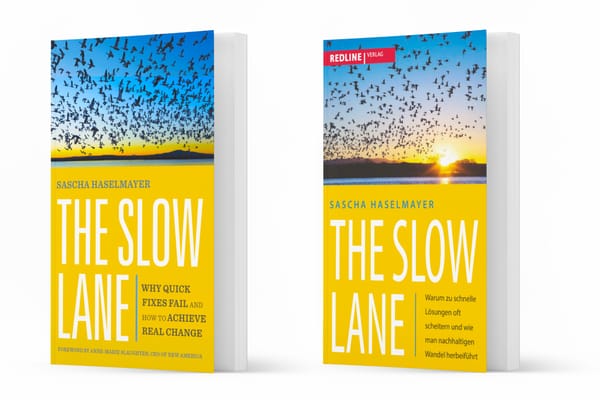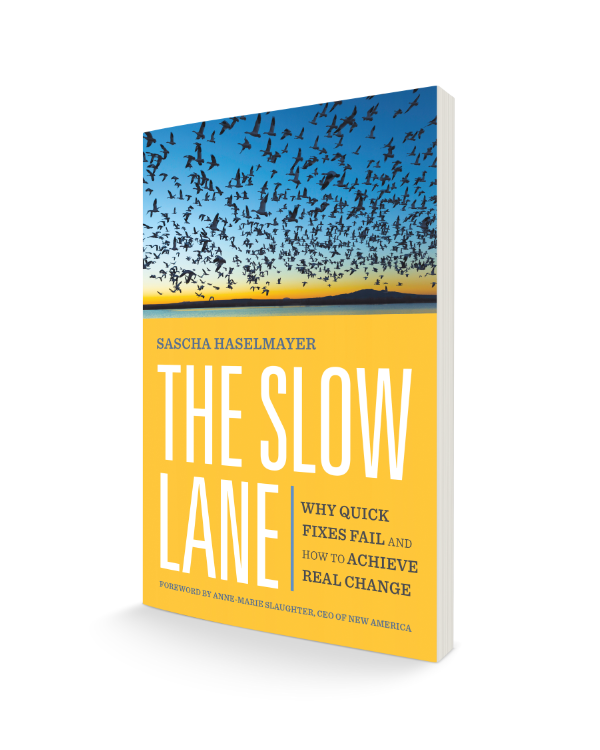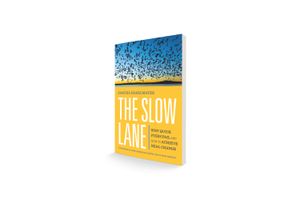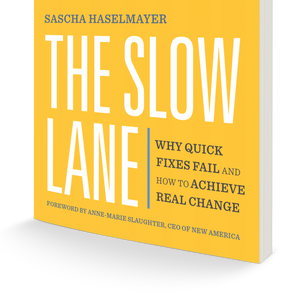
Welcome to the Slow Lane

"A beautiful journey"
Saskia Sassen
Robert S. Lynd Professor of Sociology at Columbia University
"A must read"
Darren Walker
President, The Ford Foundation
"A world of possibilities"
Dr. Philip G. Zimbardo
Psychologist and New York Times bestselling author of The Lucifer Effect, The Time Paradox, and The Time Cure
I am a social entrepreneur and author. For thirty years, my job has been to travel the world and tell people how to fix things faster. But inside of me, I had a growing sense that I was overlooking something important. What I realized was, that whenever people in power — whether in business, activism, politics, or at home — try to rush to answers, they create divisions and produce failure. Our quest to improve things faster traps us like a hamster wheel.
It was only when I opened up to slowness that I discovered a different way. All around me, I suddenly began to notice movements that were much better at solving our truly urgent problems. These slow-movers kept winning at the long game of pursuing audacious ideas by listening, extending trust and patiently empowering others. The more I learned about them, the more I loved their way.
Welcome to The Slow Lane.
Principle #1: Hold the urgency.
Don’t sacrifice inclusion, participation, or sustainability for the sake of rushing to action. The Slow Lane strives to find solutions for everyone, in keeping with the ancient slogan “Nothing about us, without us”, brought to life by disability activists around the world in the 1990s. Iceland did just that, when during the financial crisis it resisted the impulse to restore the old order, and instead invited citizens to rewrite their constitution. Holding the urgency is to know that rushing to action won't get us there faster.
Principle #2: Listen.
Don’t pretend. Act with the humility to know the limitations of your listening. How you listen reveals whether you intend to treat others as equal contributors. User Voice broke the toxic power dynamics in the probation system by recruiting ex-offenders to do the listening. This kind of listening is essential to build the kind of trust that can change hearts and minds, allow something new to emerge, and keep people involved for the long haul.
Principle #3: Share the agency.
Don’t impose your answers. Create an environment in which even the least prepared people can find comfort and have the capacity, capability, and power to choose freely if they wish to join, contribute and exert their power. User Voice engages and trains prisoners to give them a say in their rehabilitation journey. In the Slow Lane, empowerment is practiced with patience and care, meaning that this invitation meets people where they are, and remains open to anyone, at all times.
Principle #4: Nurture Curiosity.
Don’t lock into a single answer. Curiosity makes the Slow Lane more inclusive and allows transformative visions to emerge. Curiosity lets us unlearn our preconceptions and open up to new ideas. Curiosity also lets us seek inspiration from outside our immediate reality, for example from science or other movements. Without curiosity, User Voice might have become an activist prison rights movement that works against prisons, feeding on frustrated prisoners and their families. Instead, their lived experience and research revealed opportunities to work with prison leaders to improve outcomes for all. Curiosity helps movements retain the flexibility to find common ground.
Principle #5: Use Technology as an Enabler.
Don’t use technology to dominate others. Instead, develop strong human values, principles and behaviors that technology can enable. Successful Slow Lane movements have rewritten the tech playbook to withstand the growth mindsets that reduce complex human needs to what engineers believe they can solve. Tech in the Slow Lane is owned by everyone, and it uses creative new ways to enable the best in human relationships.
Order The Slow Lane book now!



Birds on the Cover?












